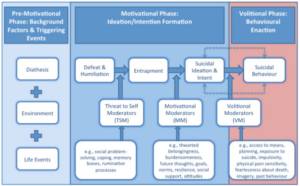Chani Nuij, MSc’s study presents the rationale and protocol of the Continuous Assessment for Suicide Prevention and Research (CASPAR) study. The research team’s goals of the study are two-fold: to evaluate the feasibility of mobile safety planning and daily mobile self monitoring in routine care treatment for suicidal patients, and to conduct fundamental research on suicidal processes.
Clinical guidelines recommend that health care professionals develop a safety plan in collaboration with their high-risk patients, to lower the imminent risk of suicide behavior. Mobile health applications provide new opportunities for safety planning, and enable daily self-monitoring of suicide-related symptoms that may enhance safety planning. The study’s adaptive single cohort design among adult outpatients or day-care patients with the main diagnosis of major depressive disorder or dysthymia, who have an increased risk for suicidal behaviors were measured. Patients were instructed to use their mobile safety plan when necessary and monitor their suicidal symptoms daily. Both of the mEMA applications are being used in treatment with the patients’ clinicians.
The results of Chani Nuij’s study provides insight into the feasibility of mobile safety planning and self-monitoring in treatment of suicidal patients. Furthermore, knowledge of the suicidal process will be enhanced, especially regarding the transition from suicidal ideation to behavior.

Chani Nuij, MSc
Department of Clinical Psychology, Vrije University Amsterdam



